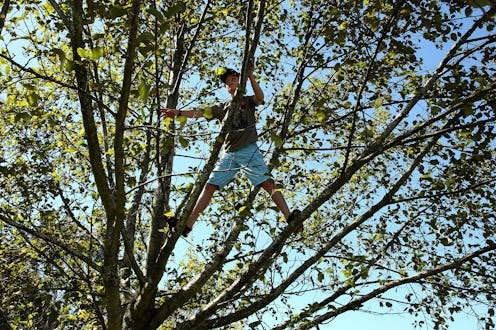If you're a fully-grown adult who still has a healthy and active inner child, I have good news for you: Climbing trees might help improve your memory. According to new research published in the journal Perceptual and Motor Skills, performing “proceptively dynamic activities” — that is, dynamic activities that make you aware of your body positioning and orientation, like tree climbing or running an obstacle course — are linked to positive benefits for our working memories. Said study co-author Tracy Alloway in a press release, “Improving working memory can have a beneficial effect on so many areas in our life, and it's exciting to see that proprioceptive activities can enhance it in such a short period of time.” Here's how the study breaks down:
The researchers first tested the working memory of a group of adults between the ages of 18 and 59. Then the participants were asked to perform a variety of “proprioceptively dynamic activities” — things like climbing trees, walking and crawling on a three-inch-wide balance beam, running barefoot, and navigating around certain obstacles. What each of the activities had in common was that they involved both proprioception and at least one more element — something like locomotion or route planning. After two hours, the researchers tested the participants' working memories again and found that not only had their memory capacity increased, but moreover, that it had increased a great deal — by 50 percent. Two control groups — one a college class learning new information in a lecture setting, and the other a yoga class geared toward seeing if “static proprioceptive activities” had the same benefits as dynamic ones — showed no improvement in memory.
Of course, what we don't know yet is why this correlation exists. The researchers speculate that the constant adaptation to environment and changing terrain needed to carry out proprioceptively dynamic activities encourages our working memory to update information — hence why the proprioceptively static activity of yoga didn't have the same benefits. More research is needed to fully understand what might be going on, but the takeaway is this: Having trouble remembering something? Go take a break and run around, jump around, or climb the nearest sturdy tree. It might kick your brain into high gear.
While we're on the subject, climbing trees isn't the only childhood activity that has some unexpected benefits; you might give these ones a shot, too, no matter how old you might be:
1. Arts and Crafts
Although there isn't much evidence that supports art therapy as a way to deal with PTSD, it has been shown to help reduce stress, especially in children. In adults, it can help us explore thoughts and feelings we may have trouble describing with words. Never underestimate the worth of a good coloring book session or a pipe cleaner statue.
2. Nap Time
In addition toboosting memory, studies have also shown that naps can lower blood pressure, reduce your risk of heart-related death, and in short, help you live longer. All hail nap time!
3. Riding a Roller Coaster
Fear is a necessary human emotion — and, indeed, we kind of dig feeling freaked out in safe environments. It's why we like roller coasters, haunted house attractions, and horror movies.
4. Snack Time
Your blood sugar has a tendency to crash three to five hours after a meal, which makes your energy and your focus flag. The key to making snack time work in your favor as an adult is sticking with healthy snacks. You might try having a handful of nuts; as the New York Times points out, numerous studies have found that small portions of nuts consumed regularly impart a whole host of health benefits.
Images: Giphy (5)
